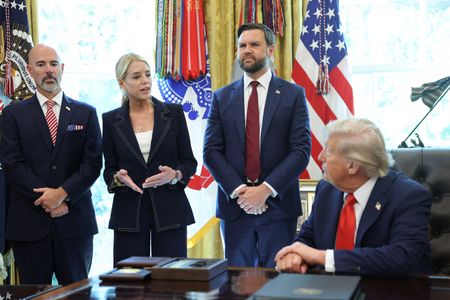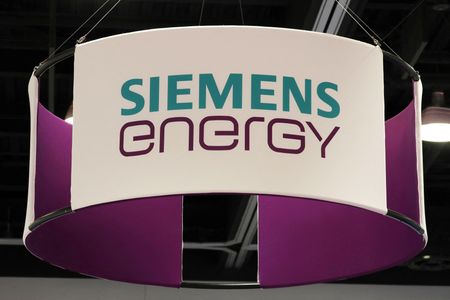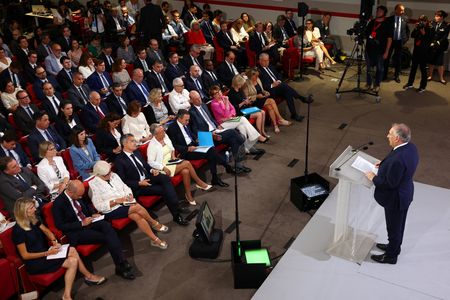By Humeyra Pamuk
(Reuters) -President Donald Trump’s administration is considering imposing sanctions on European Union or member state officials responsible for implementing the bloc’s landmark Digital Services Act, two sources familiar with the matter said, over U.S. complaints that the law censors Americans and imposes costs on U.S. tech companies.
Such a move would be an unprecedented action that would escalate the Trump administration’s fight against what it sees as Europe’s attempt to suppress conservative voices.
Senior State Department officials have yet to make a final decision on whether to go ahead with the punitive measures that would likely come in the form of visa restrictions, the sources said.
It was unclear which EU or EU member state officials the action would target, but U.S. officials held internal meetings on the topic last week, according to the sources.
While trading partners frequently complain about domestic rules they see as unfairly restrictive, sanctioning government officials over such a regulation is extremely rare. The relationship between the Trump administration and the European Union is already frayed by tariff threats and tense negotiations as well as U.S. criticism of treatment of U.S. tech companies.
Citing an internal State Department cable, Reuters this month reported that the Trump administration has instructed U.S. diplomats in Europe to launch a lobbying campaign to build opposition to the Digital Services Act in an effort to have it amended or repealed.
The EU’s DSA is meant to make the online environment safer in part by compelling tech giants to do more to tackle illegal content, including hate speech and child sexual abuse material.
Washington has said the EU is pursuing “undue” restrictions on freedom of expression in its efforts to combat hateful speech, misinformation and disinformation, and that the DSA is further enhancing these curbs.
In the early-August directive, Secretary of State Marco Rubio ordered U.S. diplomats to regularly engage with EU governments and digital services authorities to convey U.S. concerns about the DSA and the financial costs for U.S. companies.
In May, Rubio had threatened visa bans for people who “censor” speech by Americans, including on social media, and suggested the policy could target foreign officials regulating U.S. tech companies.
A State Department spokesperson did not confirm nor deny Reuters’ reporting on potential punitive action.
“We are monitoring increasing censorship in Europe with great concern but have no further information to provide at this time,” the spokesperson said in an email.
An EU Commission spokesperson declined to comment on the potential for sanctions, but had previously called censorship claims by the U.S. “completely unfounded.”
“Freedom of expression is a fundamental right in the EU. It lies at the heart of the DSA,” the spokesperson said. “It sets out rules for online intermediaries to tackle illegal content, while safeguarding freedom of expression and information online.”
‘CENSORING’ AMERICANS
The Trump administration has generally moved away from the traditional U.S. promotion of democracy and human rights, instead focusing on trying to clinch bilateral trade deals. But it has been advocating for selective causes, particularly those linked to right-wing politicians and what it sees as a muzzling of conservative voices online.
Washington imposed sanctions on a Brazilian Supreme Court justice overseeing the trial of Trump ally and former Brazil President Jair Bolsonaro, accusing the judge of authorizing arbitrary pre-trial detentions and suppressing freedom of expression.
Most striking has been the administration’s forays into the internal politics of European allies. Trump officials have denounced what they say is suppression of right-wing leaders, including in Romania, Germany and France, and accused European authorities of censoring views such as criticism of immigration.
Top U.S. officials, including Vice President JD Vance, have repeatedly lashed out at European officials and regulations, accusing them of “censoring” Americans, a claim the EU rejects.
In February, at a conference usually known for displays of transatlantic unity, Vance stunned European leaders by accusing them of censoring the speech of groups such as Germany’s right-wing AfD party and backsliding on democracy.
The EU’s antitrust and tech chiefs told U.S. lawmakers in March that the new tech rule aims to keep digital markets open and is not targeted at U.S. companies.
U.S. social media companies like Facebook and Instagram parent Meta Platforms have said the DSA amounts to censorship of their platforms.
(Reporting by Humeyra PamukEditing by Bill Berkrot)











